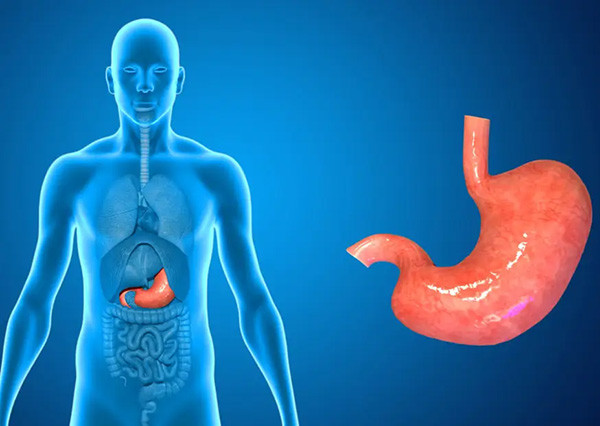Stomach-related halitosis is an unpleasant breath odor originating from digestive system disorders, especially the stomach, rather than directly from oral hygiene issues. When digestion malfunctions, fermented food or acid reflux can cause an unpleasant smell to escape through the mouth. So, what are the warning signs, specific causes, and effective treatment methods for stomach-related halitosis? Let My Auris analyze this in detail in the content below to help you understand and find a permanent solution.
Causes of Halitosis Originating from the Stomach
Halitosis originating from the stomach is often overlooked but actually signals many dangerous digestive diseases. Below are common causes of stomach-related halitosis that you should not underestimate:
Halitosis due to Gastroesophageal Reflux Disease (GERD)
Gastroesophageal Reflux Disease (GERD) occurs when stomach acid is pushed up into the esophagus, damaging the esophageal lining. This acidic environment creates conditions for bacteria to grow, leading to bad breath. If you frequently experience heartburn and burping accompanied by an unpleasant odor, you may very likely be suffering from halitosis due to GERD.

Halitosis due to Stomach Ulcers caused by HP bacteria
Helicobacter Pylori bacteria (HP bacteria) are the leading culprit behind stomach ulcers. They reside beneath the stomach lining and cause stomach ulcers, leading to inflammation caused by HP bacteria. This inflammatory process produces dimethyl sulfide, hydrogen sulfide, and methyl mercaptan—compounds that cause the unpleasant odor emanating from the stomach.
Halitosis due to a Leaky Stomach Valve
In healthy individuals, the gastric valve is always tightly closed and only opens during eating or drinking. However, in people with a leaky stomach valve, the valve remains open, allowing stomach acid to reflux into the esophagus, bringing food odors up with it, even reaching the back of the throat. This results in persistent bad breath despite thorough oral hygiene.
Halitosis due to Unhealthy Eating Habits
An unhealthy diet with foods that cause bad breath, high in sugar, fat, spicy, or acidic, can irritate the stomach, causing acid reflux or other digestive problems. This is a subtle but common cause of stomach-related halitosis.

Signs of Stomach-Related Halitosis
Below are the signs of stomach-related halitosis that you should not ignore:
- Bad breath persists after brushing: If you wake up with an unpleasant odor in your mouth, and this bad breath appears frequently, continuously, and notably does not go away even with thorough oral hygiene, this is one of the clearest signs of stomach-related halitosis.
- White coating on the tongue: A white, coated tongue is also a common sign of stomach-related halitosis. This is due to acid reflux, where stomach acid refluxes into the esophagus, irritating the oral mucosa and creating conditions for a white coating to appear on the tongue.
- Stomach problems: If you are experiencing stomach problems such as heartburn, acid reflux, or frequent vomiting, it is very likely that you have stomach-related halitosis. These symptoms are typical signs of stomach-related bad breath and require timely attention.
How to Permanently Eliminate Stomach-Related Halitosis from Within
Stomach-related halitosis not only makes patients self-conscious in communication but also affects their studies, work, and daily life. In particular, bad breath can also be a sign of dangerous digestive system diseases. Therefore, early treatment of stomach-related bad breath is essential to regain fresh breath and prevent gastric complications.
Lifestyle Changes to Overcome Stomach-Related Halitosis
Some lifestyle changes can help treat stomach-related halitosis from within, specifically:
- Brush your teeth regularly, ensuring you brush twice daily, morning and night, using a soft-bristled toothbrush and fluoride toothpaste.
- Use dental floss and mouthwash after meals to clean plaque and food debris between teeth.
- Drink at least 2 liters of water daily to support saliva production, thereby reducing mouth odor.
- Rinsing with saline solution helps prevent plaque, kill bacteria, and alleviate bad breath caused by acid reflux.
- Limit foods that cause acid reflux such as: alcohol, beer, coffee, carbonated drinks, high-acid fruit juices (orange, lemon), chocolate, spicy foods.
- Avoid bending forward after eating, heavy physical activity after eating, and lying down immediately after eating for at least 2 hours.
- Say no to smoking, rapid weight loss, and wearing overly tight clothing, as these habits can worsen acid reflux.

Treating Stomach-Related Halitosis with Traditional Herbs
If you experience mild stomach-related halitosis, you can consider safe folk remedies for bad breath:
- Mint leaves: Thanks to their numerous aromatic essential oils that combat bad breath, simply chewing fresh mint leaves and rinsing your mouth can instantly freshen your breath.
- Fresh lemon: Vitamin C effectively kills bacteria and reduces odors. Use diluted lemon water daily for oral hygiene, then rinse with clean water to prevent the acid from damaging tooth enamel.
- Fresh ginger: A very effective spice for treating stomach-related halitosis. Ginger’s aroma and compounds help cleanse and disinfect; rinsing daily with fresh ginger water helps you maintain fresh breath throughout the day.
Medical Treatment for Halitosis Caused by a Leaky Stomach Valve
When stomach ulcers, acid reflux, or a leaky stomach valve cause bad breath, patients need to visit a healthcare facility for a doctor to prescribe appropriate treatment. Below are common drug groups for treating stomach-related halitosis:
Proton Pump Inhibitors (PPIs): Such as Omeprazole, Lansoprazole, Esomeprazole, Pantoprazole, Rabeprazole, which reduce stomach acid levels by inhibiting the acid-producing receptors in the gastric lining. PPIs are usually prescribed to be taken 30 minutes before meals, daily for 4-8 weeks to permanently treat stomach-related halitosis.
H2 Receptor Antagonists: Including Cimetidine, Ranitidine, Famotidine, Nizatidine, which inhibit Histamine at H2 receptors in the gastric parietal cells, thereby limiting stomach acid secretion and reducing gastric fluid.
Antacids:
Absorbable antacids: Sodium bicarbonate, calcium carbonate,…
Non-absorbable antacids: Aluminum hydroxide, magnesium hydroxide,…
Prostaglandins: Capable of inhibiting acid secretion by reducing cyclic AMP and enhancing gastric mucosal protection.
Sucralfate: A sucrose-aluminum complex that creates a protective layer over inflamed gastric areas against acid, pepsin, and bile salts.
Understanding how to permanently treat stomach-related halitosis from its internal causes will help you effectively resolve bad breath and prevent recurrence. From lifestyle changes, using natural herbs, to applying the correct medical treatment regimen, you can completely control this condition, thereby regaining fresh breath and confidence in daily communication.





